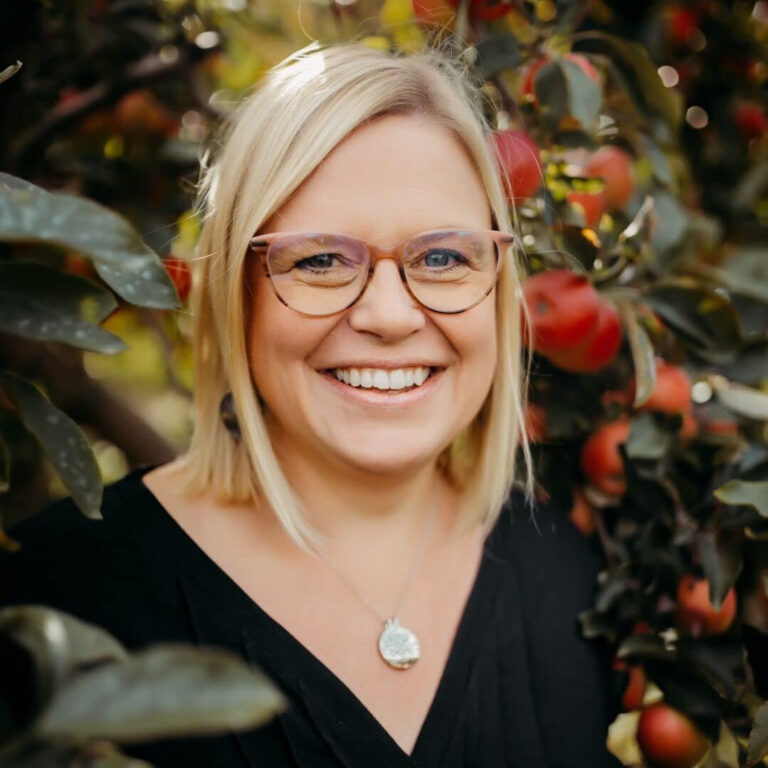“All human nature vigorously resists grace
because grace changes us and the change is painful.”
– Flannery O’Connor
Lest you think more highly of me than you ought, please know that one of my family’s most cherished (but least sacred) holiday traditions is sitting down every December to watch National Lampoon’s Christmas Vacation.
Year after year we laugh as Clark Griswold’s roaring rendition of “Hark the Herald Angels Sings,” turns to road rage. We eagerly await his proclamation, “Later dudes!,” followed by his wild descent down the sledding hill on his fiery saucer. And a core memory for my children is their dad’s fumbling fingers during his annual panicked grab for the remote control as he attempts to fast forward through Clark’s poolside, red-bikini fantasies.

During this year’s viewing of this Christmas classic, it was the pleading (and sappy) bedtime exchange between Clark and his wife, Ellen, that stuck out in my mind:
Clark: “Ellen! I want to have Christmas here in our house. It means a lot to me. All my life I’ve wanted to have a big family Christmas.”
Ellen: “It’s just that I know how you build things up in your mind, Sparky. You set standards that no family event can ever live up to.”
Clark: “When have I ever done that?”
I’m no Clark Griswold—I didn’t hang one Christmas light on our house this year—but I can relate to his struggles with expectations and overly-idealized version of nostalgia. It can be a battle to let go of our visions of how things are supposed to go.

More meaningful than any holiday movie-watching this season, I’ve been reading short daily passages from Melody Beattie’s The Language of Letting Go. A practice inspired by a friend’s recommendation, Beattie’s words have been particularly helpful for me during this season of Advent when it can be easy to prepare just about everything but our hearts.
In one particular December meditation, Beattie tells of a friend who asked her: “How much do we need to let go of?”
To which she replied, “I’m not certain, but maybe everything.”
Like Clark Griswold, I can get lured by shiny things. Beyond the cliché of “remembering the reason for the season,” I need a yearly reminder that the birth of our Messiah was messy, dirty, earthy.
I need a reminder to let go of my expectations. I need a nudge to a path that is muddier—but also wider and steadier—than the precarious tightrope of this world’s version of Christmas cheer.

Perhaps I should have titled this blog, “The Book is Better than the Movie,” because another book that is saving me this season is Claire Keegan’s miraculous novella, Small Things Like These. This year marked my third re-reading of this quiet, slender novel that teaches me more each time I open its pages.
Set in a small Irish town during the 1980s, the story follows Bill Furlong, a coal and timber merchant. During the traditional preparations for this Christmas, Bill is confronted with unsettling truths about a Magdalene laundry run by the local covent. A grim reality in Ireland’s history, these laundries subjected unwed mothers and “fallen women” to harsh labor and brutal treatment.
Chided by more than one person to mind his own business, Bill, the illegitimate child of his own unwed mother, can’t look away.
Like Clark and Ellen Griswold, Bill Furlong and his wife, Eileen, have a bedtime debate about how to navigate the strains of the holiday season. While Ellen tries to lower Clark’s idealistic expectations of a good ol’ fashioned family Christmas, Eileen tries to convince Bill that the injustice and cruelty he witnessed at the convent is not a problem that concerns him: “‘Where does thinking get us?” Eileen asks Bill. “‘All thinking does is bring you down.’ She was touching the little pearly buttons on her nightdress, agitated. ‘If you want to get on in life, there’s things you have to ignore, so you can keep on.’”
At the risk of spoiling the book’s ending if you have yet to read Keegan’s contemporary parable, I find its final pages more gritty and heartbreaking than any warm-fuzzy, family-gathered-gleefully-around the tree, fireplace-blazing, faces-shining Christmas movie.
I also find it better.
Not unlike the Gospel story. Not unlike the raw and messy reality of heaven coming down to the earth. Not unlike redemption. Not unlike grace.
In the final scenes of the book, as Bill does not what is easy or expected, but what he is called to, we witness both his exhilaration and an understanding of the weight of his decision.
He—and we—are not given any easy assurances.
The book’s final paragraph does not offer exactly comfort and joy, but a rare and holy concoction of both: “The worst was yet to come, he knew. Already he could feel a world of trouble waiting for him behind the next door, but the worst that could have happened was also already behind him; the thing not done, which could have been— which he would have had to live with for the rest of his life.”

Outside my window, the snow has given way to slush and the dark brown of soil seeps through. It’s less of a white Christmas, than a muddy one. Messiah has come to earth. It’s not shiny, but it’s good.
Melting snow photo by Kathyryn Tripp on Unsplash
* * * * * *
As 2024 draws to a close, we at the Reformed Journal thank you for your friendship and support. If you have not yet done so, we ask for your financial support for the coming year.
“But Wait…There’s More!” is our special offer where we will send you three new books in 2025 as our thank you for a gift of $300 throughout the coming year. That’s $25 per month, less than a dollar a day. (Canadian friends, unfortunately due to exchange rates and bank fees, we need to ask for a $400 annual gift from you.)
The purple button above or clicking here, will take you to a page with details on this year’s special “But Wait, There’s More” offer–three new books from Reformed Journal Books in 2025!
You can use the same page to give an online gift of any amount or to find info on giving by check via mail.
Gifts may be mailed to:
PO Box 1282
Holland, MI 49423
Thank you for your generous support





9 Responses
I liked everything about this post, especially those last lines. It’s not shiny, but it’s good.
Dana,
Thank you for this essay. Your way of seeing the mud and snow mix of this week is a great metaphor for a healthier way of viewing Christmas and life (and makes the lack of snow more tolerable–even meaningful). As a gift, I was just given two of Keegan’s books. I loved “Foster,” and now, with your thoughtful perspective here, I will read “Small Things Like These.”
Thanks, Dana. Lovely.
You and National Lampoon. Wow. I guess I can’t help thinking highly of you anyway. Thanks for this.
Hey, Dana, thanks so much. I like the idea of a blue Christmas. My sister’s church offers such a service. Oh and your recognition of National Lampoon Christmas affirms my thinking the world of your writing, your insights, you.
You talked about books vs. movies….. While I haven’t read the book “Small Things Like These,” I did see the film recently while it was showing briefly at Celebration Cinema in Grand Rapids a number of weeks ago (after my Irish DIL mentioned their family had just seen it in Washington, DC). I thought it was excellent, albeit a little hard to follow the story line. It helped that I knew about the “Magdalene” houses / laundries beforehand. I would recommend seeing it.
Thanks! I’m hoping to watch it soon!
Thanks, Dana, for turning the light on that gem of a book; and yes, surely worth reading more than once!
Thanks for your thoughtful post. Loved it. Also a fan of “Small Things Like These.”